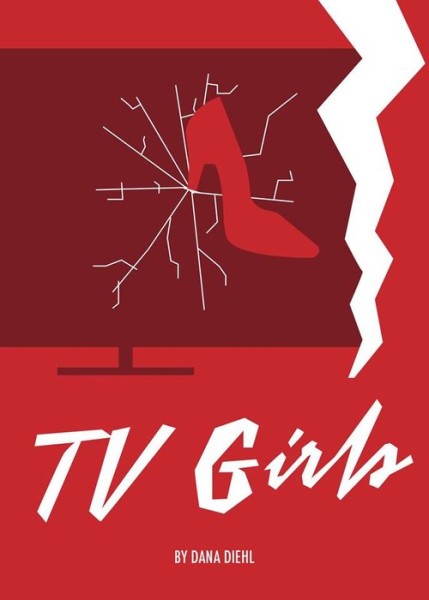
by Kelly Lynn Thomas
Dana Diehl’s new chapbook, TV Girls (New Delta Review, August 2018), is a collection of short stories based on reality TV shows and celebrities. You don’t need to be familiar with The Bachelor or Sister Wives to enjoy the characters or their struggles, though. Whatever you’ve gleaned from reading People headlines in the grocery store checkout line and from your friends’ Facebook feeds is enough of an entry point. The six stories in the collection aren’t exactly satire, but they aren’t exactly homages to reality TV either. They’re something in between, a chimaera of expectation-skewering, healthy cynicism, fascination with human behavior, voyeurism, and feminist commentary.
The poet Chen Chen, who selected Diehl’s manuscript as the 2017-2018 New Delta Review Chapbook Series winner, says of it, “Story after story, Diehl discovers fraught vulnerabilities and startling truths in the lives of girls and women confronting the expectations of TV, lovers, family, and one another.” An apt description, as reading TV Girls felt like being an archaeologist from the future, excavating 21st-century life, uncovering its dirty laundry and hidden secrets one by one.
The collection’s eponymous story, presumably based on The Bachelor, explores a group of 25 women “looking for love.” None of the women are named, only referred to with letters, and they drop out of the story one by one as they leave the set, seemingly having failed their quest. But of course, the quest was artificial from the beginning, and the story reminds the reader of this harsh fact over and over again. “The TV girls believe they can find love on national television,” the unnamed narrator states at the beginning. Right from the start, we know it’s a lost cause. What’s more, we as readers and watchers know that the TV girls themselves know it’s a lost cause. “Each TV girl says, he’s really, really the one.”
We know he’s not, but that’s part of reality TV’s charm—we get to watch other people make a mess of their lives from the comfort of our living rooms. The tension in this story comes not from which girl will wind up with the “Potential Husband,” but from the narrator’s increasingly naked desire to see things go wrong, and the more explosive, the more dramatic, the better. That theme comes up again in the collection’s final story, “Conjoined,” a story about conjoined twins Jenna and Lily, who also happen to be the last girls on earth. Before the world ended, they had their own reality show, and now they live in abandoned TV sets in Los Angeles. Their lives were always scripted, and even with no audience left, it’s as if they are performing, struggling to maintain appearances. “When everyone was already looking, there was no point in trying to hide,” the girls muse.
Because of course, Diehl’s stories are as much about the people who watch reality television as the shows and celebrities themselves. They push and pull against that base desire we all feel to watch the train wreck, mouths agape at the rubble, the blood, the fire. As a culture, we’re obsessed with reality TV because it allows us to indulge in fantasy and drama, not in spite of it.
Even the stories that aren’t directly based on specific reality TV shows have a reality TV show feel. In “Must-Haves,” a couple goes house shopping, and the story is told through a list of the things their new house has to possess. No fewer than three bedrooms to accommodate future children. A finished basement to shelter the family in case of tornado or hurricane. A claw-foot tub in which the narrator can escape an affair she imagines her spouse will have in the future.
This narrator imagines all the worst-case scenarios: fire, famine, the end of the world. The couple is young, and it’s easy to picture them, though Diehl never actually describes them physically. He’s a smartly dressed professional with a high salary and an eye on the corporate ladder. She’s the artsy type working on her first book. Both of them are fit and attractive with straight, white teeth.
It’s no leap to imagine them on a show like House Hunters, searching and searching for the right home, never finding it because of some minuscule flaw, like the “wrong” paint color or the lack of that claw-foot tub. Happiness knocks on their door, but they are too afraid to answer it, too afraid to face the possibility of failure, so their potential remains unfulfilled. The viewer remains on the couch, safely watching the drama of strangers’ lives, never venturing out to live her own life.
Regardless of the source material, Dana Diehl has a knack for the poignant detail. One of my favorites is from “Buddy,” a story about Cake Boss star Buddy Valastro. When he gets his family lost at sea, the narrator notes that “Most of the cakes he makes for his show are beautiful but flavorless, made of refrigerated sheet cake and covered with fondant.” It’s the artifice again, the beautiful lie. Appearances aren’t everything, though we all pretend they are.
Ultimately, TV Girls left me acutely aware of the way our culture has found innumerable ways to commodify the very act of living. We consume these stories, gobble them up, and we can’t get enough of them. The viewer is just as culpable for this spectacle as the people who are directly involved—and perhaps even more so. In a way, these six stories feel like cautionary tales. Instead of warning against vanity and vice, they remind us that happiness and fulfillment only come if we are willing to get down in the dirt, wrestle with our desires and shortcomings, failing, but in our failure finding truth.
______________________________
 Kelly Lynn Thomas reads, writes, and sometimes sews in Pittsburgh, PA. She lives with her partner, one dog, and a constant migraine. Her fiction has appeared in Permafrost, Sou’wester, The Journal of Compressed Creative Arts, and was nominated for a 2017 Pushcart. Kelly received her MFA in Creative Writing from Chatham University, is a coordinator for the VIDA Count, and can always be found with a large mug of tea.
Kelly Lynn Thomas reads, writes, and sometimes sews in Pittsburgh, PA. She lives with her partner, one dog, and a constant migraine. Her fiction has appeared in Permafrost, Sou’wester, The Journal of Compressed Creative Arts, and was nominated for a 2017 Pushcart. Kelly received her MFA in Creative Writing from Chatham University, is a coordinator for the VIDA Count, and can always be found with a large mug of tea.

 The core workshop of SmokeLong Fitness is all in writing, so you can take part from anywhere at anytime. We are excited about creating a supportive, consistent and structured environment for flash writers to work on their craft in a community. We are thrilled and proud to say that our workshop participants have won, placed, or been listed in every major flash competition. Community works.
The core workshop of SmokeLong Fitness is all in writing, so you can take part from anywhere at anytime. We are excited about creating a supportive, consistent and structured environment for flash writers to work on their craft in a community. We are thrilled and proud to say that our workshop participants have won, placed, or been listed in every major flash competition. Community works.